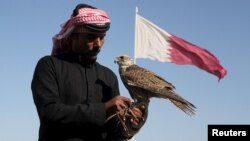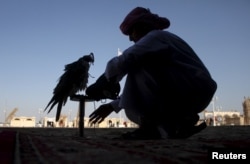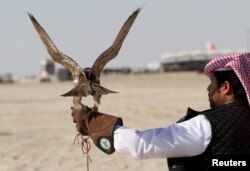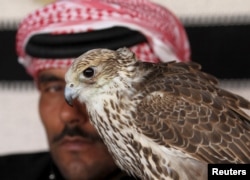A group of Qatari falcon hunters who were kidnapped in southern Iraq in 2015 are reportedly free after a complex regional deal that included a swap between rebels and regime forces in four Syrian towns, Iraqi and Syrian sources told VOA.
"The release operation of all hostages is complete now," Shakhawan Abdullah, a member of the Iraqi parliament's security committee, told VOA.
The 26 Qataris — some of whom are members of the ruling family — were taken to Doha by a Qatari plane that left Baghdad International Airport on Friday evening.
The group was kidnapped by a group of 100 armed men in December 2015 during a hunting trip in the Muthanna governorate of southern Iraq, a famed desert spot for falcon hunters.
No group publicly claimed responsibility for the kidnapping. Qatari and Iraqi officials said that based on intelligence reports, they were certain the hostages had been taken in Iraqi Shi'ite territory by militias with close ties to Iran.
Little information had surfaced since their abduction as to their whereabouts or condition. It was unclear whether the hostages were initially kept in Iraq or moved to Iran or Syria, Iraq's Abdullah said.
In April 2016, the Qatari Foreign Ministry said one of the hunters and an Asian worker on the trip had been freed.
Party of God Brigade
"Government officials say the hostages were held by Shi'ite civilians, but our investigations point to Kataib Hezbollah," Abdullah told VOA. Kataib Hezbollah, or Party of God Brigade, is a Shi'ite paramilitary group with close ties to Iran and the Syrian regime.
But the complex deal to release of the hostages emanated from Syria and was reached between the Syrian regime and Syrian rebels last month, sources said.
It reportedly included an agreement to evacuate people and rebels from Madaya and Zabadani, predominantly Sunni towns in northwest Syria that have been besieged since June 2015 by the Syrian army and fighters from Lebanon's Hezbollah movement.
In return, people in the villages of Foah and Kefraya, most of whom are Shi'ites, were allowed safe passage. Residents have been encircled by rebels and al-Qaida-linked Sunni jihadists since March 2015.
The hostages would have been released earlier, sources told VOA, but the evacuation was halted following a suicide bombing April 16 that ripped through a convoy of buses coming from Foah and Kefraya, killing 126 people. There was no claim of responsibility, and movement of people from villages has continued.
According to the British-based Syrian Observatory for Human Rights, the deal was drafted by Qatar — which backs the opposition to the Syrian regime — following negotiations between representatives of Iran, Hezbollah and a Sunni Islamist rebel alliance.
A person involved in the negotiations told The Associated Press that Qatar paid tens of millions of dollars to Shi'ite groups and to the al-Qaida-linked Levant Liberation Committee and Ahrar al-Sham, which are involved in the freeing of villagers.
'Completely humanitarian' effort
A Qatari source told CNN that Qatar had helped sponsor the deal to free Syrian villagers but denied it was linked to the hostages being freed.
"In regards to the four-towns agreement in Syria, Qatar has sponsored negotiations since the beginning of 2015," the source told CNN. "It's completely humanitarian and has nothing to do with Qatari hostages in Iraq."
Iraq's Interior Ministry said the hostages were interviewed after they were freed and before being handed over to Qatari authorities.
Earlier, during his weekly news conference on Tuesday, Iraqi Prime Minister Haidar al-Abadi said his government was doing its best to free the group.
"Qatari citizens came to Iraq with official visas granted by the former interior minister, and they should have been under the protection of the Interior Ministry specifically, but unfortunately they were kidnapped," Abadi said. "We have exerted a great deal of effort to secure their release, to obtain any information that would lead to their release."
Iraqi parliament member Abdullah told VOA that members of parliament would demand an investigation of the hostage release process and connections to Syria.
"The issue, as it stands now, is very unclear to us. We will have many questions when the parliament meets next week," Abdullah told VOA.
VOA's Mehdi Jedinia contributed to this report.













